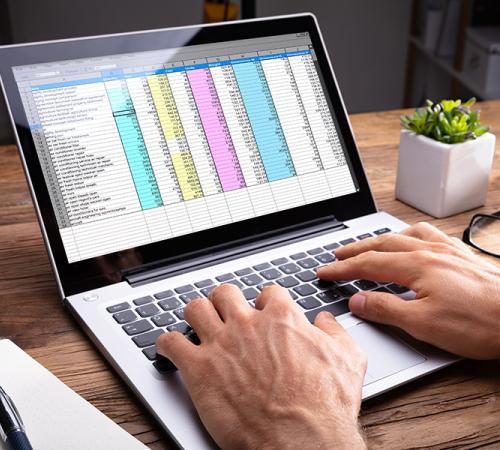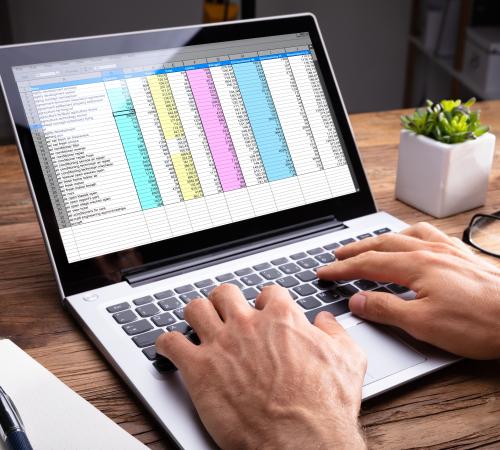

But knowing when and how to register for VAT may feel daunting if your company is just starting out. Get all the facts and discover how to become VAT-registered with this helpful Hiscox guide.
Which businesses must register for VAT?
A business generally needs to register for VAT once its annual taxable turnover rises above £85,000. This is known as the VAT threshold.
So, you should register if your turnover was above £85,000 in the previous 12 months – or will be in the coming 30 days.
However, it’s also possible to voluntarily become VAT-registered if your turnover is below the threshold.
Certain goods and services are exempt from VAT. These include financial services, training and sports activities. You don’t need to register if all your products or services are VAT-exempt.
What’s included in your taxable turnover?
When it comes to the VAT threshold, your taxable turnover can include:
- Sales of any goods and services, so long as they’re not VAT-exempt
- Any building projects your firm completed itself worth more than £100,000
- Items that were bartered, sent as gifts, or part exchanged
- Products your customers hired or borrowed from you
- Personal use of business goods
- Goods classed as being zero-rated (external link)
- Services from overseas companies that were reverse charged (external link). Find out how Brexit has affected VAT for online sales with our guide.
What do you need to register for VAT?
To avoid delays, you’ll need to gather the correct documents before starting the VAT registration process.
The key information includes:
- A tax reference or National Insurance number
- Your business bank account numbers
- Records for related companies owned in the previous two years
- Turnover figures
- Main contact details.
How to become VAT-registered online
In most cases, you’ll need to register for VAT online via the HM Revenue and Customs (HMRC) website. Paper application forms are also accepted in specific circumstances.
Here are the main steps to follow when registering on the web:
- Head to HMRC’s online services page (external link)
- Sign in with your Government Gateway ID and password. You’ll be asked to sign up for a Government Gateway account if you don’t have one already. This 12-digit ID code enables you to access different HMRC services via the web
- Once logged in, click on ‘Register for HMRC taxes’ under ‘Your HMRC services’
- Go through the different on-screen instructions on how to register for VAT.
How do I register for VAT in the UK by post?
You can register for VAT via a postal applicationif you meet specific criteria. These include:
- Applying for a ‘registration exception’
- Signing up for the Agricultural Flat Rate Scheme. This gives farmers an alternative to the traditional VAT registration process
- Getting separate VAT numbers for different business units or divisions.
You’ll need to download and print a form called VAT1 from the HMRC website and then send it back to the tax authority.
What happens after my VAT registration?
If your registration proves successful, you should receive a VAT certificate from HMRC within 30 days. For online applications, this should appear in your Government Gateway account. It’ll come in the post if you sent off a paper application form.
The VAT certificate should contain:
- Your company’s VAT number, which features nine digits
- The date when you should send in your first VAT return and payment
- Your official date of registration.
What are my main duties after registering?
You’ll have duties to take care of once you’re fully up and running as a VAT-registered business. They include:
- Adding VAT to the prices you charge customers and keeping records. The standard VAT rate of 20% covers most goods and services
- Recording the VAT you pay to other companies when making business purchases
- Sending regular VAT returns to HMRC, showing both the tax you’ve charged customers and paid to suppliers. Most businesses do this quarterly, but eligible firms may receive an annual option
- Making VAT payments to HMRC. Use the difference between the amount of VAT you’ve charged and paid to work this out.
Is it worth registering for VAT?
Your company’s unique goals and circumstances will ultimately determine whether it’s worth registering for VAT voluntarily. If your turnover exceeds the £85,000 VAT threshold, the decision is out of your hands. This also affects what kind of tax return you’ll need to complete – find out more about tax returns here.
The potential benefits of voluntary registration include:
- Claiming VAT backon your business expenses. Use your VAT return to flag any tax you’ve paid when buying from other firms
- Boosting your reputation. Including your VAT number on letters, invoices and other official documents might increase trust in your brand
- Instilling financial discipline. Being VAT-registered forces you to keep a closer eye on your accounts while maintaining accurate records. This could help reduce accounting errors in future
- Shielding your turnover figures. Voluntarily registering means your rivals can’t see that your turnover is under £85,000.
How to find out if a company is VAT-registered
It’s easy for customers and business partners to confirm your VAT registration. You’ll need to give them your VAT number via an invoice or other business document.
HMRC offers a helpful online tool (external link) where users can type in any VAT number they wish to check. This should then bring up the company’s name and address, confirming its VAT registration.
Using this tool also allows you to confirm supplier information when you fill in a VAT return yourself.
The road to accounting success
Registering for VAT doesn’t have to be complex or stressful. Your annual taxable turnover can act as a starting point, telling you whether registration is mandatory or voluntary. And from there, it’s an easy online or postal process, with each step clearly laid out for you.
To learn more about tax and small business accounting, head to our Knowledge Centre.
Disclaimer:
At Hiscox, we want to help your small business thrive. Our blog has many articles you may find relevant and useful as your business grows. But these articles aren’t professional advice. So, to find out more on a subject we cover here, please seek professional assistance.





